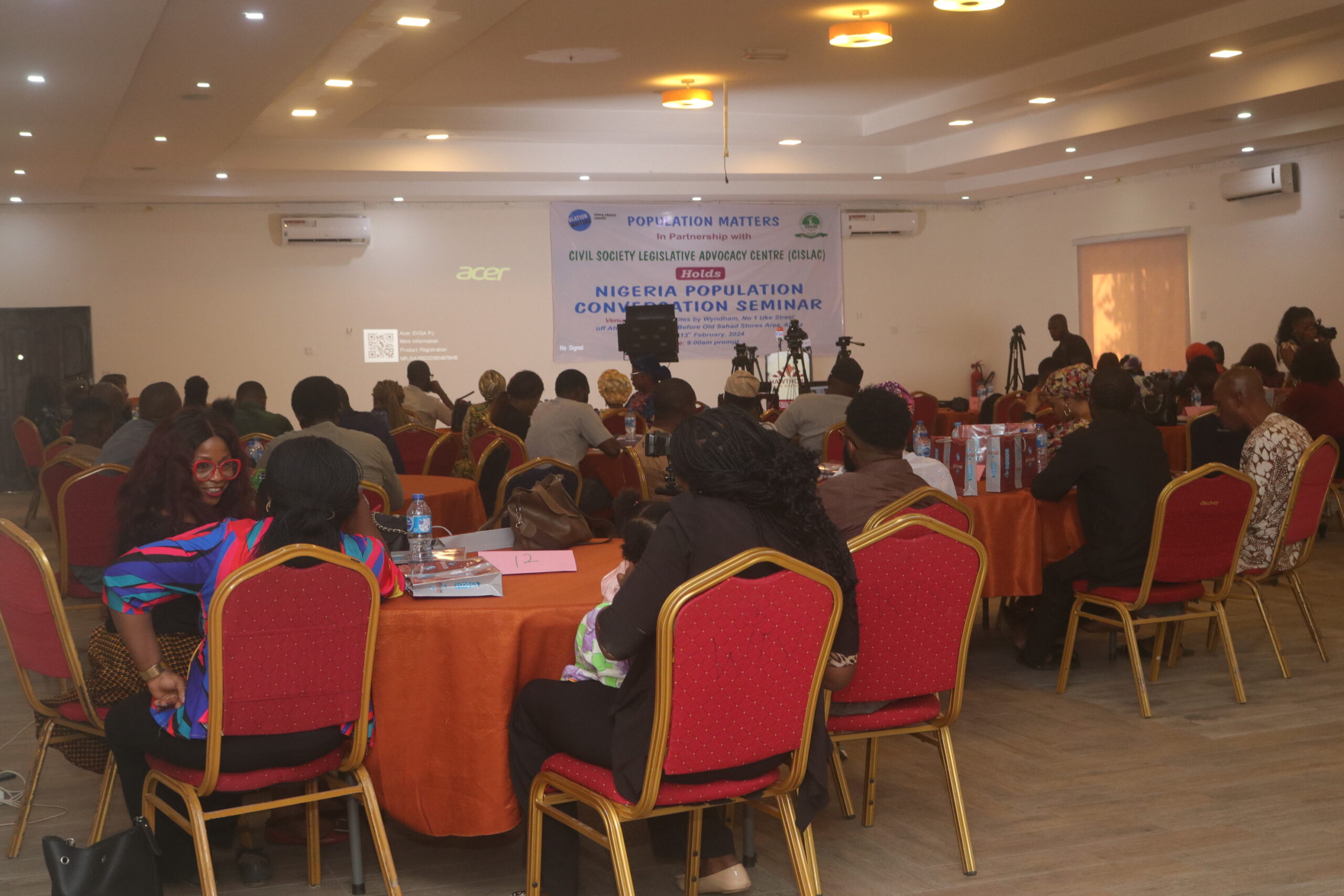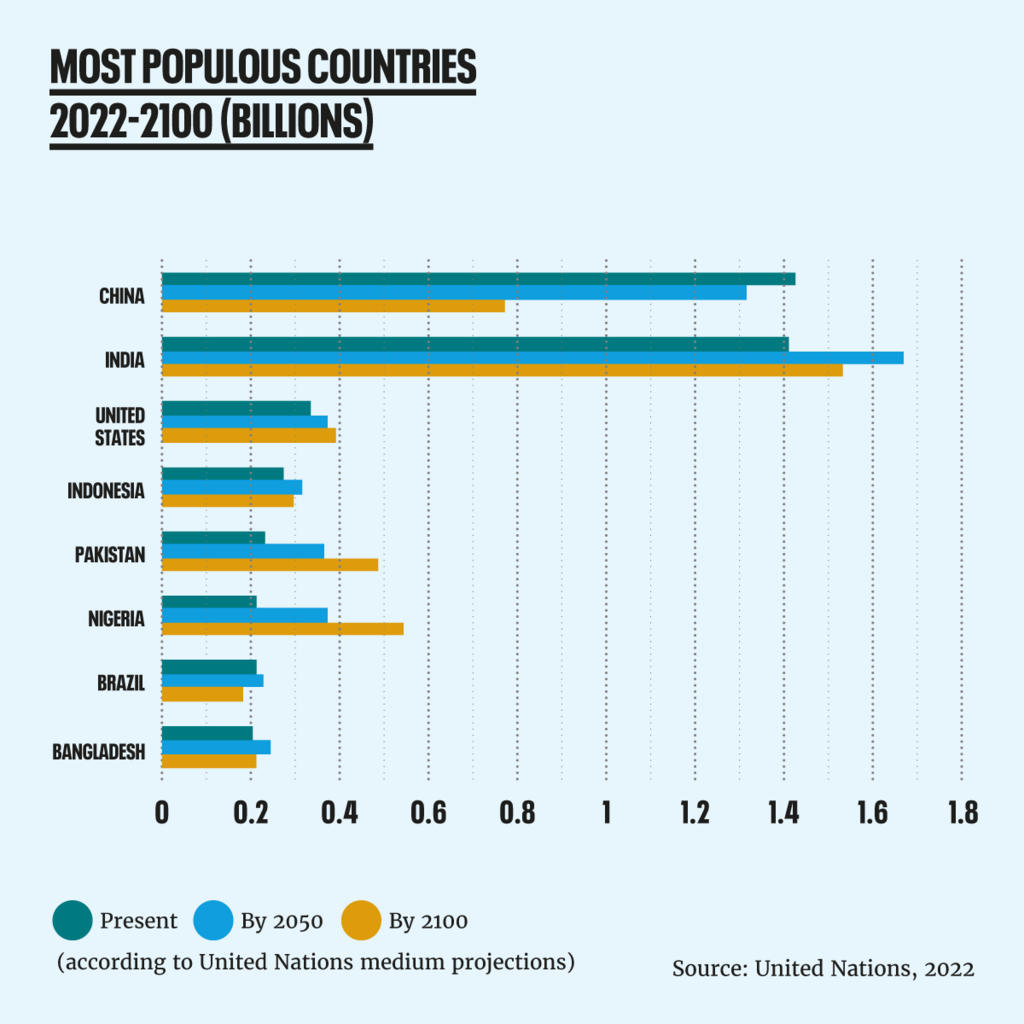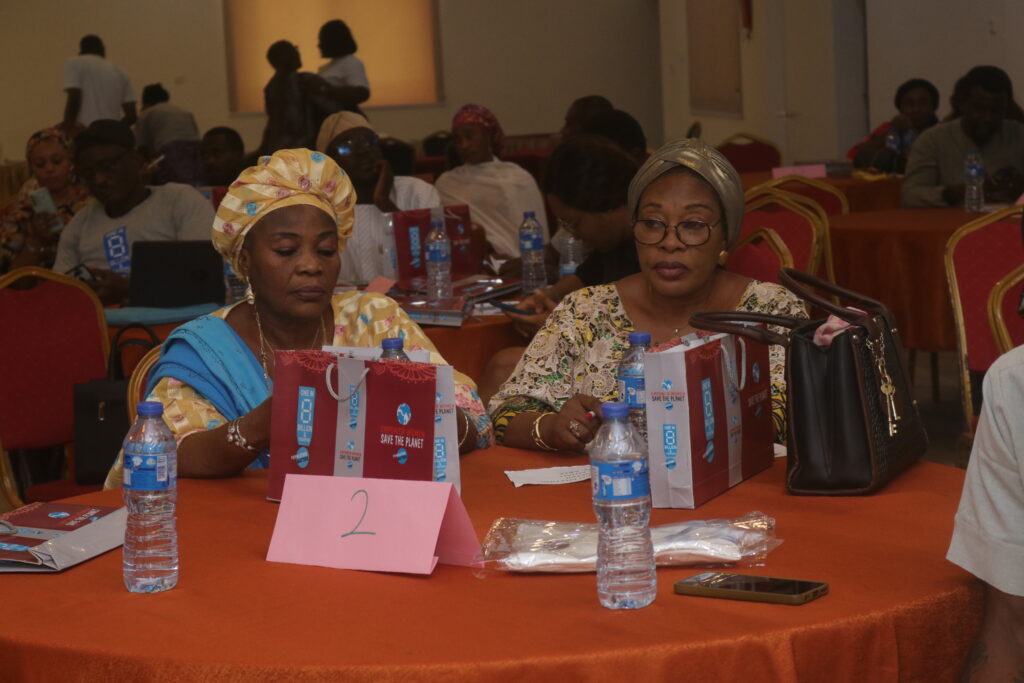
Unemployment, insecurity and inequality: Talking population in Nigeria
In recent weeks, we have published a number of blogs looking at population growth in Nigeria in the lead up to our Population Conversation roundtable event last week. In this final article in the series, we report on the event in Abuja, the work of our partners and how the Nigerian media reported events.
Last week, more than 90 people from across the country gathered in Abuja, Nigeria’s capital, to discuss population growth – one of Nigeria’s greatest challenges. Those people represented campaign groups, government, researchers, environmentalists and experts from across Nigeria. The event was Population Matters’ second national Population Conversation, following our successful roundtable in Kenya in 2022. Once again, the day was a huge success.
The Nigeria Population Conversation event was devised as a means to “amplify national voices and local actions with evidence-based advocacy towards a sustainable population in Nigeria”. The event has been many months in the making and could not have taken place were it not for our local partner, Civil Society Legislative Advocacy Centre (CISLAC) / Transparency International Nigeria (TI-Nigeria). CISLAC is a non-governmental, non-profit, advocacy, information sharing, research and capacity building organisation based in Abuja. It is also the Nigerian branch of TI-Nigeria, a global coalition against corruption.
Some background
Today, Nigeria has a population of just over 226 million, is the world’s 6th most populous country and is currently growing faster than any other country. It’s set to overtake the US as the third most populous nation in the world within 30 years.

While preparing for the event last year, we asked our friends at Population Explosion Awareness Initiative Nigeria (PEIA) to collaborate with us in capturing what Nigerians think about population growth. PEIA travelled the country to speak to people about the issue, as well as garnering fascinating insight from the National Population Commission (NPC). You can see the final video below.
what do Nigerian people think about population?
Nigerian population survey
There hasn’t been a census in Nigeria since 2006, meaning all current population statistics are based entirely on estimations. With an understanding of population growth and inter-connected issues like family planning and sexual and reproductive health and rights (SRHR) so integral to development, we wanted to better understand not just the current lay of the land in Nigeria, but what these issues looked like from the perspective of the Nigerian people.
While population affects every facet of societal development and Nigeria’s population, depicted as a demographic nightmare to be, is projected to reach 400 million by 2050, doubling the current estimate. Yet open, deliberate discussion around population remains uncommon in Nigeria.”
Auwal Ibrahim Musa (Rafsanjani), Executive Director CISLAC/TI-Nigeria
Together with CISLAC/TI-Nigeria, Population Matters commissioned a wide-ranging survey to understand the perception of population issues among Nigerian people across the whole country. To the best of our knowledge, there has never been a survey like this conducted before in Nigeria, with researchers covering every region of the country speaking to more than 700 people face to face.
Some of the themes covered were knowledge about the population of Nigeria, gender, environment, health and SRHR.
The majority of those surveyed believe that higher population growth does not bring benefits – more than three times the number who thought it was beneficial. More than a third of people believe that population has an impact on environment and nearly double that believe that the rate of population growth affects agriculture, food security, biodiversity and the sea.
We cannot conceal the fact that with the current inadequate awareness on consequences of population at citizenry and policy levels as well as the unattended impact on national planning, Nigeria has not efficiently harnessed its population to achieve development goals.”
Auwal Ibrahim Musa (Rafsanjani), Executive Director CISLAC/TI-Nigeria
Only 136 people (18.81%) said contraceptives are very accessible to Nigerian girls and women, but almost two-thirds of respondents identified low birth control measures as a key driver of population growth, indicating a clear disparity and opportunity. The importance of education in empowering women and girls was prioritised above all other options by both males and female respondents.
[the report] tells us that Nigerians are concerned about population growth, that they are willing to act but expect their government to do more. It shows the importance they attach to education and family planning, and their recognition of the ways in which population growth here can have a negative impact. But there is also a significant diversity of views and knowledge – on contraception, on the rights and freedoms of women, on population and on what should be done, among much else. I think we should expect no less and I’m sure we will explore those today.”
Abimbola’s opening remarks
If you’d like to delve further into the survey data, you can see the full report here.
Bringing knowledge and skills to bear
Following months of preparation, people finally gathered in the morning of Tuesday the 13th of February. The day kicked off with a powerful introduction from Mr Musa, Executive Director of CISLAC/NI-Nigeria who stressed the challenges and the need for action. His speech was followed by a welcome from Population Matters’ Voice, Partnerships and Advocacy Manager, Abimbola Junaid. Explaining who Population Matters is, and what our goals for the event are, she went on:
It is not our job to tell people what to do with their lives, and it is certainly not our job to come to Nigeria and pretend we know the answers. What we can do is help to catalyse a conversation in which the people who understand the situation, the challenges, the sensitivities and in particular the opportunities can come together to look at their situation and their options. That is what today’s event is all about.”

Following the opening remarks, there were a number of contributions from various stakeholders. These included; Margaret Edison, Chairman of NPC (who you can see speaking very powerfully in the video on this page), and member of the Population Matters Expert Advisory Group Dr Edu Effiom, Director of Forestry, Forestry Commission & CRS Focal Point on Climate Programs.
…because women are the worst hit in situations like these, so we have to rethink girl child marriage and empower the girl child through good education. This will considerably check population growth with corresponding benefit of a better life for the girl child among others.
Dr Edu Effiom
observations and recommendations
After Abimbola had presented the findings from the survey, the session broke into groups to identify, document and present Strengths, Weaknesses, Opportunities and Threats and identify next steps for the Nigeria Population Conversation and findings of the launched report.
After much deliberation, the groups made the following observations:
- While population affects every facet of societal development, discussion around population remains uncommon in Nigeria; this puts Nigeria’s population at a demographic nightmare.
- With the current low awareness on consequences of population, Nigeria has not efficiently harnessed its population to achieve development goals.
- Lack of population planning has been identified as a main contributory factor to youth unemployment, insecurity, inaccessible healthcare services, food insecurity, education inequality and other challenges that undermine socio-economic development of Nigeria.
- While Nigeria is recognised among the top five countries in the world with the highest under-five mortality rates, the growing socio-economic, demographic and environmental factors further threaten the survival of under-fives in the country.
- The growing unemployment rate (53.4% as reported by the National Bureau of Statistics in 2022) exposes Nigeria to more social crimes perpetrated by youths.
- Overconsumption of the global north through untamed human activities exposes the ecosystem to massive pollution threatening human survival with Nigeria largely impacted.

What’s next for Population Conversation Nigeria?
The day was an unqualified success, generating a public debate (see below) and bringing together key people to enhance understanding and identify opportunities. For Population Matters, it was an opportunity to get a far deeper understanding of the challenges and opportunities in Nigeria than we could otherwise ever have had.
The most important thing now is building on the day to create momentum for change. The participants agreed to the following recommendations:
- To form a platform to sustain inclusive conversation on population, and cascade awareness at all levels and to shape policy direction for well-informed and proactive population planning.
- Embrace the idea of smaller families.
- Deliberate policy and legislative engagements leveraging the fact-findings from the survey report to provoke targeted national population planning.
- Immediate consideration to translate key findings from the survey report into local languages for wider dissemination.
- Integrate active adolescent and youth engagement as a critical stakeholder in population conversation, community sensitisation and awareness for improved population literacy.
- Decrease population growth by discouraging girl child marriage, supporting education and empowerment of the girl child, embracing ethical planned parenthood.
- Strengthen collaboration among the National Population Commission, education sector, civil society, traditional institutions, faith-based organizations to amplify awareness and sensitisation on population planning and sustainable development.
- Adopt intensive climate-friendly agriculture practices and infrastructure..
- Increase investment in further research and development to keep abreast of the direct impact of population on Nigeria’s environment and society at large.
Coverage in the media
The event was a great success, with a wide range of Nigerian society represented, much spirited debate and concrete outcomes. Thanks to the work of local partners, there was also a lot of media interest and about 30 media outlets were in attendance.
This Day led with the headline TI Says Nigeria’s 400m Projected Population by 2050 is Demographic Nightmare. It largely reported comments made by Auwal Rafsanjani, Executive Director, CISLAC/TI-Nigeria, including:
While a significant function of girl-child education in Nigeria is to provide her with diverse basic knowledge, skills, and training which contribute to personal development and the overall national development, more than 50 per cent of girls are not attending school at the basic education level, while one million girls drop out between the first and last year of primary school.”
The Blueprint headline was Over population: Embrace smaller family to avoid poverty, CISLAC, TI – tell Nigerians, an article that carried quotes from Rafsanjani and Dr Edu Effiom. The Guardian Nigeria also added weight to their report with the views of attendees Nasir Kwarra and Margaret Edison, Chairman of the NPC and the Director of the Population Management and Development Department of the NPC, respectively. Nigeria accounts for 20% of out-of-school children in sub-Saharan Africa — CISLAC was the headline in The Times Nigeria, which focussed on the impact of population growth on young Nigerians.
You can find more stories on our media coverage page here.
Thanks to all those involved
We would like to thank everyone who was involved in the planning and execution of the event.
Firstly, the event was a triumph for our own Abimbola, who worked incredibly hard over the last few months to bring it about, and who expertly chaired and managed events on the day. Thanks to PEIA, and particularly Chidera Benoit, for conducting dozens of interviews with people all over Nigeria and capturing the content that contributed to such a powerful video.
Thanks also to everyone who attended the Nigerian Population Conversation. The knowledge, commitment and tenacity on show in the room was inspiring and the agreed recommendations are a testament to that.
Finally, we would like to offer our sincere thanks to CISLAC for helping to organise the survey and the event. Without their insight and tireless work none of it would have been possible. We look forward to collaborating further in the future and seeing what comes next from the Nigeria Population Conversation.
